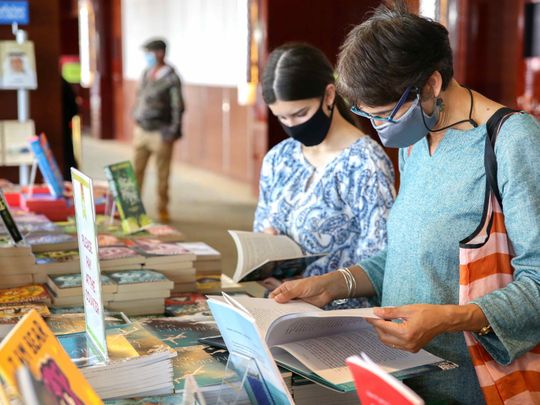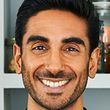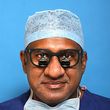
Dubai: The best way to combat fake news on the COVID-19 pandemic and to win over anti-vaxxers, or those who are opposed to vaccination, is to present stories, facts and information in a straightforward and easily digestible language. This was emphasised by Emirati doctor-writer Dr Nafea Alyasi and United Kingdom-based doctor-writers Dr Jay Jayamohan and Dr Rupy Aujla during a session titled ‘Fighting the Anti-Facts Movement at the 2021 Emirates Airline Festival of Literature on Friday. The session was sponsored by Gulf News.
The trio noted fearmongering and disinformation are very serious problems and the medical world is plagued by conspiracy theories and pseudoscience that put public’s health at risk. Like the LitFest theme that says ‘Change the Story’, the experts noted that there is a critical need to “change the narrative” when disseminating information to the public.
Use social media correctly
Dr Alyasi said: “We need more doctors on social media to give the correct information. People turn to social media — it’s like a big ocean of information — but sometimes people get wrong answers because they ask the wrong people. Doctors should go to the people and be more available on social media to give factual information.”
He added in the UAE, there is a big trust in the government because the leaders themselves took to social media to show it’s safe to take the vaccine. “Maybe six months back, many people were hesitant about the vaccine – they were not anti-vaxxers but just hesitant – but when they saw the UAE leaders getting the jab, they became more confident,” Dr Alyasi continued.
“Locals and residents are more accepting of the vaccine and the UAE ranks number two in the world, after Israel, with the highest number ratio of vaccination. Now we are around 30 per cent of the population and before summer, it could be 60-65 per cent,” added Dr Alyasi who has created unforgettable stories of life in hospital with his novels: Unforgotten Patient, Critical Case, Search for Life and his latest, Marburg.
Root out the problem
Dr Jayamohan added social media is not the only source of misinformation – it is also prevalent among families, peers, cultural and ethnic groups. He said to understand the present misgivings on vaccination, one has to look at the long history of problems and controversies in medicine — from the vaccine scandals in the 1950s and 1960s to one-way information sharing.
He said it also important to encourage the public to question any medical misinformation and the problem can be rooted in the failure to give digestible and easily understandable knowledge. “We are not giving easily digestible info and this is where misinformation comes,” explained Dr Jayamohan who is Consultant Paediatric Neurosurgeon at the John Radcliffe Hospital, Oxford, and star of two highly acclaimed BBC fly-on-the-wall series Brain Doctors and Children’s Craniofacial Surgery.
Break the language barrier
Dr Aujla, meanwhile, said “distrust is not new and social media rewards negativity. When someone is saying a controversial narrative, sometimes, people get drawn towards it". His solution is to have better communication to debunk the myths.
He added it is also important to break the language barrier and to speak in the common language. He said it is important to explain the nuances of medical information to everyone so as not only those with high level of education may understand them. Dr Aujla is a practicing NHS GP in London. Trained at Imperial College London, he is the leading voice in how nutrition can beat disease and improve health. He is also the founder of the non profit Culinary Medicine UK and The Doctor’s Kitchen.











